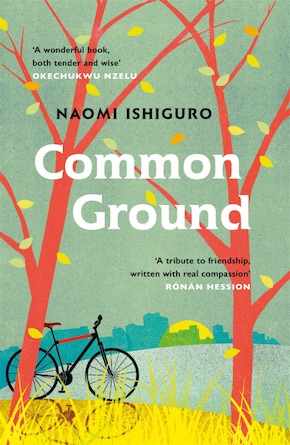My struggles with cultural appropriation
by Naomi Ishiguro
“A generous and disarming tale of loyalty, injustice and hope.” New Statesman
My debut novel Common Ground tells the story of a friendship between two boys from very different backgrounds. Stan is a child of suburbia, struggling with bullies as the new scholarship kid at a private school. Charlie is Romany, and lives on the Traveller site on the outskirts of town.
My aim for Common Ground was to write a book which celebrated friendship and solidarity across cultural boundaries. I also found myself becoming very interested in the literal land of England. I wanted to write about the dynamic it creates in a country when a very small number of people own the majority of the land, and declare some people welcome on it, and others to be trespassers. In addition to all this, I was feeling increasingly frightened by the toxic narratives around race, nativism and belonging that seemed to be resurfacing in Britain, particularly following the 2016 EU referendum, and wanted to write about that, in connection with this theme of land and public space. The people of the Romany community are on the absolute frontlines of the question of who the land belongs to, and it seemed right for the story that one of my two main characters should be from that community. I worried a lot, though, about the ethics of me writing a character from a world to which I didn’t in any way belong.
I definitely don’t believe that writers shouldn’t write fiction about people different from themselves. The reason I write at all is to imagine and research and question what life might be like lived in someone else’s shoes, and more broadly than that, fiction writing at its best is a feat of empathy, which inspires empathy in its readers. Then there’s also the fact that in simply more practical terms, writing any kind of fiction at all will surely necessitate writing about people different from yourself, as of course the world is full of them. If I were, for instance, to write a whole novel populated only by half-Japanese, half-Scottish millennial women living in London, I think most readers would be pretty confused.
Then again though, the process of writing characters who are from very different backgrounds to yourself – particularly characters who experience a level and type of discrimination that you yourself don’t experience – is a very complicated and uncomfortable thing. In a large part, I think it’s perhaps because writers in the past often haven’t approached the task with respect, or having properly done their research. It’s something that has provoked a lot of anger, and rightly so. To anyone who dismisses the anxiety and debates over cultural appropriation in fiction as being in some way unimportant or missing the point, I’d say this: imagine having your voice repeatedly silenced because of the fact of your ethnicity, class or gender, only to see other people who don’t have your lived experience being allowed to tell stories in which they make sweeping and incorrect generalisations, which lead to years of toxic assumptions, aggression and even violence towards you from the wider public. Would you feel that to object to that was unreasonable, or missing the point?
Any kind of fiction will necessitate writing about people different from yourself. If I were to write a novel populated only by half-Japanese, half-Scottish millennial women living in London, most readers would be pretty confused.”
At least three times I seriously thought about scrapping Common Ground, doubting whether I should be the one to try and tell this story at all. I kept coming back to the fact, though, that given it’s a story about friendship across cultural boundaries, it would be almost impossible for anyone to tell it without creating at least one character who was very different to themselves. In the end, I came to a conclusion I felt happy with: that writing about characters from backgrounds different to my own could be done respectfully, and avoid the pitfall of cultural appropriation, if it were done in line with the following questions and principles. Of course, most of these are pretty obvious just in terms of common sense and decency, but I’ve found setting them out clearly like this can still be useful.
The first question I asked of myself was, had I done my research properly? Had I gone out and talked to and listened to people from the Romany community? Had I made sure I’d got the details right? Had I read books and poems written by Romany authors? Had I read up on Romany history, and the Anglo-Romani language? I also asked myself who I was expecting my readers to be. If I’d been writing Common Ground with Romany characters but not for Romany readers, then that would have been a definite red flag for the project.
The other essential question in this whole area seems to me to be this: are your characters individuals, operating in your story first and foremost as proper, three-dimensional, specific people in their own right, or are you using them to stand as a representatives of the community they are from? Characters like this who are more symbols than people can only ever be dehumanising, and perpetuate the wearying and unpleasant idea that anyone from a minority can be seen as representative of that minority.
It also seems key to me that you don’t pass fiction off as fact, and that you don’t present something as lived experience if it isn’t. My novel is written in the third person, and I found that slight distance from the characters very helpful. For me personally, writing Charlie – the main Romany character in the book – in first person would have felt too close to trying to co-opt someone else’s voice. Finally, it should go without saying that you should avoid playing into any negative stereotypes.
The most important aspect of this whole topic I haven’t mentioned yet is the major underlying issue, which is of course that certain groups in our society, and not only minority groups – think, for instance, about the lack of working-class writers being published in Britain – are staggeringly under-represented in the literary and wider arts and media worlds. Until the day when it isn’t de facto the case that only certain types of people are allowed to write professionally and have their voices heard, there will be justified fury infusing this whole debate about who has a right to tell what story.
Thinking about writers specifically from the Romany community for a moment, Romany culture is so rich in creativity, and yet the number of mainstream Romany writers and creatives in Britain is still disappointingly small. Why? It’s definitely not down to a lack of talent from within the community itself. The reasons are too extensive for me to set out here, but they’re not new, difficult to work out or surprising. Structural inequality, bullying and ignorance within the education system, and the economic unfeasibility of sustaining life as a writer or creative freelancer without a financial cushion all play a part. These are the really important things that we as a society need to address, beyond the question of cultural appropriation in fiction.
In June of last year, the BBC announced that they would make £100 million available to commission diverse and inclusive content over the next three years. The charity Friends, Families and Travellers as well as other advocacy groups, and Gypsy, Roma and Traveller people working in the creative industries, signed a letter to the BBC, asking the organisation to state its commitment to amplifying voices from the GRT communities. I can only hope the BBC will listen, that others like them will make similar efforts and launch similar initiatives, and that 2021 will be the year that all of this starts to change for the better.
 Naomi Ishiguro is the author of the acclaimed story collection Escape Routes (Tinder Press, 2020). A former bookseller and Bibliotherapist at Mr B.’s Emporium in Bath, she now lives and writes in London. Common Ground, her first novel, is published by Tinder Press in hardback, eBook and audio download.
Naomi Ishiguro is the author of the acclaimed story collection Escape Routes (Tinder Press, 2020). A former bookseller and Bibliotherapist at Mr B.’s Emporium in Bath, she now lives and writes in London. Common Ground, her first novel, is published by Tinder Press in hardback, eBook and audio download.
Read more
naomiishiguro
@NaomiIshiguro
@TinderPress
Author portrait © Rosie Powell

